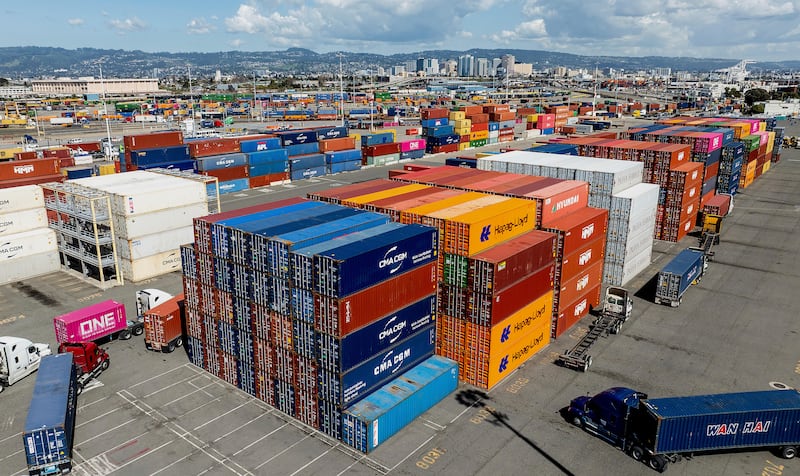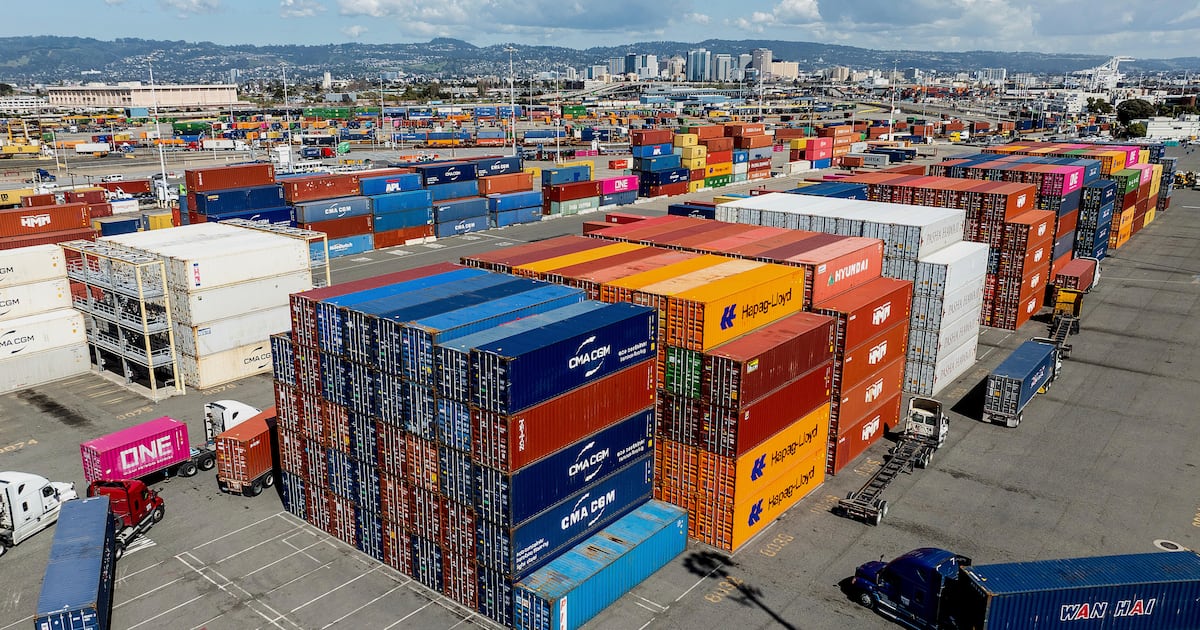 Cargo containers line a shipping terminal at the Port of Oakland on April 3. (AP Photo/Noah Berger)
Cargo containers line a shipping terminal at the Port of Oakland on April 3. (AP Photo/Noah Berger)
My company, Ermine Skate, makes high-end Nordic ice skates here in Alaska. We don’t just assemble products from parts sourced around the world and slap a “Made in Alaska” sticker on them. Our skates are machined in midtown Anchorage, finished with polymer-ceramic coating in Palmer, and sharpened in College Village or on the Hillside. We’ve put hundreds of thousands of dollars into the local economy and donated thousands of dollars of product to local nonprofits. We hire local artists, designers and tradespeople. Ermine Skate is genuinely homegrown.
Some believe that the high tariffs recently put in place by the United States will be a godsend for Made in USA product-based small businesses like ours. The trade war, we are told, is being fought on our behalf.
This could not be further from the truth. High tariffs and the resulting trade war are increasing the cost of raw materials and machinery, throwing our retailer network into chaos, scaring consumers, and profoundly damaging the standing of American brands in international markets.
First things first: let’s make sure we’re on the same page with tariffs. Tariffs are taxes paid by importers on imported goods. Tariffs are not paid by foreign companies or governments. They become a cost of doing business, and — absent bailouts, subsidies, etc. — all costs of doing business must ultimately be borne by consumers. It has already been widely reported that the high tariffs imposed by the United States will necessarily drive up prices for retail goods; less discussed is the fact that these sweeping tariffs also substantially increase costs for local manufacturers.
The U.S. has placed huge tariffs on steel, aluminum, and other raw materials used to manufacture domestically. Ermine’s skates, as it happens, are primarily made of stainless steel and aluminum.
Tariffs have also been placed on the very manufacturing equipment that American companies need to make things. The Ermine Skate shop uses a specialty “radius machine” built in the Netherlands to grind a precise curve onto the base of our skate blades, and our most expensive machine is an industrial CO2 laser made in China. Expanding our capacity with more machines, or replacing parts like grinding wheels or laser tubes, is now far more expensive. If trade with China ends entirely, at some point our laser will effectively become bricked. While I’d be happy to see machines like these made domestically, this won’t happen overnight and creating financial hardship for, if not bankrupting, American manufacturers who currently rely on imported machinery is counterproductive.
Most products exist in small ecosystems made up of related products, and ours are no exception. Our skates are fully Made in USA, but skaters also need bindings, boots, and safety equipment. These items are all produced in nations now subject to high tariffs.
For example, Ermine Skate sells reliable ice safety products made in Sweden, which was abruptly subjected to a 20% EU-wide tariff on April 2; this was subsequently reduced to 10% for 90 days. Moreover, since the trade war began the value of the U.S. dollar has plummeted against European currencies. At the time of this writing, the dollar has lost about 14% of its value against the Swedish krona, which is the currency that we transact in when purchasing Swedish products. Together, high tariffs and a falling dollar mean higher costs for those who want to enter the sport and safely use our locally-made products. Realistically, this also means lost sales.
Cost increases and uncertainty aren’t just hitting us and our individual customers, they’re also hitting our retailers. The vast majority of outdoor equipment is made abroad, and many of the mom-and-pop brick-and-mortar small businesses that sell outdoor gear are quietly panicking. Nobody knows what their costs will be a week from now, or whether they will even receive product. One successful outdoor shop in the Lower 48 recently told me that they’ve completely stopped placing preorders for next season. Preorders come with significant discounts and create stability; forgoing them demonstrates a stark lack of confidence in the future.
The lack of confidence at outdoor retailers parallels major stock market losses, rising treasury bond rates, and a dramatic decline in overall consumer confidence in the United States. According to a recent University of Michigan study, American consumer confidence now sits at its second-lowest level since 1952 — lower, even, than during the Great Recession of 2008. As much as I’d like to think of Nordic skating as a necessary part of life, the reality is that when consumers are scared and losing money they shift purchasing away from non-essentials.
Could high tariffs block foreign competitors and — at least temporarily — give my company a de facto monopoly? Perhaps. But a government-induced monopoly in a depressed market is nothing to write home about. And monopolies stifle innovation and result in poorer value for consumers. I don’t see my competitors — Zandstra, Lundhags, etc. — as enemies. I see us as running a race together and building an industry that helps make people fit, happy and excited about the outdoors.
A few days ago, I was talking with an international partner about strategies for navigating the trade war. Though we’ve had nothing more than a cordial professional relationship, this individual began suggesting that I watch videos about his country’s history and culture. I was confused at first, but as we continued the conversation the underlying message became clear:
We like working with you Americans. For decades we’ve admired you, helped you and agreed to your deals. Why are you suddenly acting like you hate us?
You might wonder what country this person is from. My answer is that it could be any country in any continent, couldn’t it? The United States has declared economic war on the entire world. The world is responding not only with reciprocal tariffs and boycotts of American goods, but also with shock, confusion and a feeling of deep betrayal. The economic damage we are causing may be reversed, eventually. But the political, reputational and even moral injury we are inflicting is in some ways the most painful, and may be the hardest to undo.
Paxson Woelber is a born-and-raised Alaskan, business owner. He lives in Anchorage.
• • •
The views expressed here are the writer’s and are not necessarily endorsed by the Anchorage Daily News, which welcomes a broad range of viewpoints. To submit a piece for consideration, email commentary(at)adn.com. Send submissions shorter than 200 words to letters@adn.com or click here to submit via any web browser. Read our full guidelines for letters and commentaries here.
